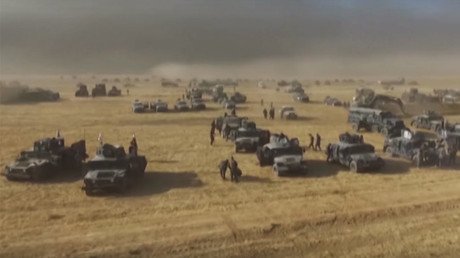'Who can guarantee Iraqi forces will not flee the Mosul battlefield - again?'
Secretary John Kerry and Defense Minister Ashton Carter don’t seem to know what is going on, says Ray McGovern, former CIA officer. Mosul has the same rubric that we used in Vietnam when “it became necessary to destroy a town to save it”, he adds.
As the Western-backed military operation in Mosul intensifies, officials in Europe are warning that it might backfire with an increased terror threat on the continent.
The UK's International Development minister said that as ISIS gets squeezed in the Middle East, the group's presence will be felt elsewhere including both in Europe and America.
And the EU's law enforcement agency Europol echoed his sentiments claiming that military pressure on the terrorist group could provoke a deadly response.
The operation has been going on for more than a week now and according to the mainstream media, it's been a success.
However, the UN hasn't been so upbeat calling the consequences of the operation a "humanitarian catastrophe."
Former CIA official Ray McGovern thinks the situation is made worse by the fact some key US politicians are simply out of touch.
RT: At the last UN Human Rights Committee meeting it was announced that they expect “the largest man-made displacement crises in recent years” resulting from the offensive to retake Mosul. What actions should be taken by the anti-ISIL coalition and Iraqi forces to prevent a humanitarian crisis?
Ray McGovern: I am not sure that they are anticipating this kind of thing. Their planning for such catastrophes has not been very good, witness Iraq, Syria and Libya. All we have here are people who are not frankly very competent. I had a chance to observe Secretary John Kerry in person just two weeks ago, when he was asked about the breakdown and the ceasefire in Syria he said something which is archetypical of the way he and the Defense Minister Ash Carter operate: “Syria is as complicated as anything I have ever done in my public life in the sense that there are probably about six wars going on at the same time: Kurds against Kurds, Kurds against Turkey, Saudi Arabia, Iran, Sunni, Shia, everybody against ISIS, people against Assad, Al-Nusra…this is a mixed up sectarian and civil war and strategic and proxies, so it is very difficult to be able to align forces.”
That just indicates to me that Secretary Kerry doesn’t know what is really going on and neither does Ashton Carter. Carter is trying to persuade the Iraqis to allow the Turks to help out and retake Mosul. Mosul is considered by the Turks their territory. If Carter thinks that he can persuade the people in Baghdad, the Shia there who are running things, to except a Turkish presence in Mosul, he is crazy. Similarly, the Turks invaded Syria. Did anybody say anything? I guess what I’d have to say here is that our statesmen, if that is the right term, are outmatched by the people in Asia who typically outmatch them.
There are a lot of fools who are trying to hustle the East, and the problem is that many thousands of people will be killed and it seems to be the same rubric that we used in Vietnam: We have to destroy that city to save it.
RT: According to the same committee the refugee flow of over 1 mln people is expected as result of the offensive on Mosul, 700,000 of which will need urgent assistance. Do you think that these concerns should be taken more seriously by the coalition?
RM: It is whistling in the wind to think that a million displaced people can be handled by a bunch of tenths. The way to prevent displaced people from being displaced is to stop bombing their homes. The Chinese have a way of saying “This will come to a no good end.” And what do I mean by that? The crackerjack, the very expertly trained and equipped Iraqi forces that everybody is depending upon to retake Mosul two years ago they ran away. Not only that, but they left a lot of very heavy sophisticated equipment, tanks on the battlefield. ISIS has those now. What is the guarantee that the crackerjack Iraqi forces will not once again run away. And who will be left? The thousand or so US forces there, some of them are going to get killed and this will become an election issue: why didn’t we do more, is what they will say…
Aleppo & Mosul: How Western rhetoric on anti-terror ops changes depending on location (VIDEO) https://t.co/mzXFiwdm8k
— RT (@RT_com) October 22, 2016
RT: The US has been highly critical of the Russian anti-terrorist offensive on Aleppo in Syria. How is that any different to the US-led operation in Mosul?
RM: Well, Mosul is going to be worse. What we had in East Aleppo was a situation where a ceasefire had been worked out. What happened, of course, was the United States Air Force, in its own wisdom, bombed fixed Syrian Army positions – army positions that had been there for six months. They said it was a ‘mistake.’ Yet the whole ceasefire fell apart and what happened next, of course, was that nobody got out of Aleppo without great danger, and it was impossible to resupply Aleppo with the crucial things they need. There are crocodile tears being shed about what happened in East Aleppo. No one likes destruction and killing, but this could have been avoided had the US Air Force decided to obey the Commander-in-Chief and not attack Syrian Army forces.
The statements, views and opinions expressed in this column are solely those of the author and do not necessarily represent those of RT.













